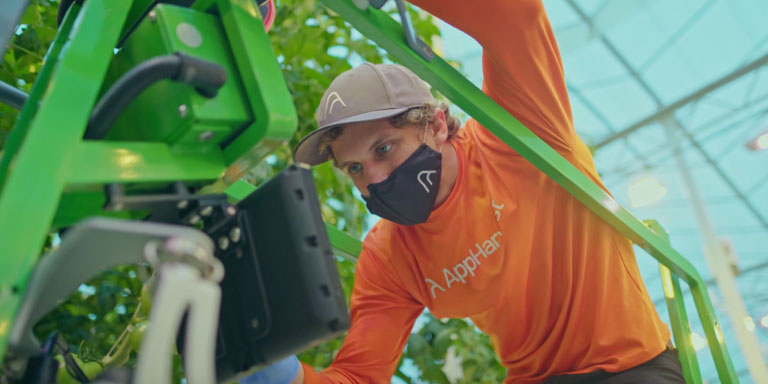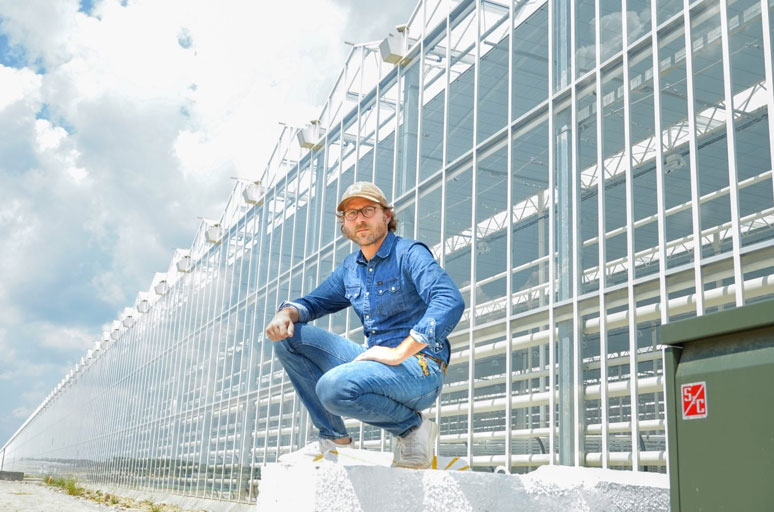Is AppHarvest the Future of American Farming?

Morehead, Kentucky isn’t a tourist destination. Nestled into the foothills of the Appalachian mountain range, Morehead is a bucolic idyll inhabited by nearly 8,000 locals. But it appears that all of that is quickly about to change.
Why? Because Morehead, Kentucky is the site of what may be one of the most significant projects for humankind’s future.
AppHarvest, a firm focused on sustainable and AI-enhanced agriculture, recently completed its flagship project there. They constructed, and are now operating, a 60-acre high-tech indoor farm in Morehead set to transform the future of farming. AppHarvest’s Morehead facility is one of the largest greenhouses globally and is the size of 50 football fields. Completed in 2020, AppHarvest says that the futuristic greenhouse yields up to 30 times more crops per acre than traditional open-field farming. Its futuristic edge doesn’t end there. The company is developing and testing AI robots to help harvest crops and these robots are designed to get better at farming the more they do it.
So why does the world need a supersized, robot-powered greenhouse in the first place?
Global food production currently accounts for 33% of all greenhouse gases, 80% of all deforestation, 70% of all loss of terrestrial biodiversity, and 70% of all freshwater use.
By the year 2050, researchers say the world will have a population of 11 billion. That means 11 billion people will need food and resources, all while we also struggle to preserve the other forms of life with whom we share the planet. Today, there are less than 8 billion people on Earth, which means our population will grow by 2 billion in just thirty years. AppHarvest says it has the creative solutions to prevent large-scale food insecurity and devastation to our climate and other life.
AppHarvest’s CEO, Jonathan Webb, is a Kentucky native committed to sustainability worldwide and the creation of jobs in Appalachia for years. After studying the region and the unique needs of large-scale agriculture, he launched AppHarvest in hopes of serving both missions.
Webb was the first person in his family to receive a college degree, graduating from the University of Kentucky in 2007 with a bachelor’s in business. After moving to New York, Webb says he slept in his car while job hunting. He eventually moved to D.C. and found a position supporting the Department of Defense. He worked on a solar energy project designed to help military installations tap into renewable sources.
Still, Jonathan had a wider vision. He saw the jobs created by wind and solar farms but realized that many of them were temporary construction jobs that vanished once the installations were complete. He imagined a farm of a different kind, one that would serve an essential global need while also providing hundreds and even thousands of lasting, meaningful jobs.
Kentucky offers a fascinating historical ground-zero for Webb’s vision. Like many native Kentucky residents, he grew up amid a transition that shook the foundations of the state and its people. Traditionally a coal mining area, Webb saw communities rocked by devastating and deadly coal mining accidents. Then, he saw the community shaken again by shuttered plants and lost jobs. Webb has stated in interviews that in addition to helping provide food sustainably, he also wants to bring an influx of jobs to his home state, one that’s still reeling from a changing energy landscape and evolving economy.
But it’s not just a historical or personal motivation that led Webb to position AppHarvest in Kentucky. The location is also less than a day’s drive to more than two-thirds of the entire population of the United States. Why does this matter? Because it allows AppHarvest to deliver their crops to a huge percentage of the population with minimal travel, reportedly reducing diesel use for transportation by as much as 80%.
His plans include a network of indoor farms spread throughout Eastern Kentucky and Central Appalachia, which he says is perfect for rainwater collection, considering its extremely wet climate.
So, when can you buy produce grown by robots in a futuristic greenhouse? It’s possible that you already have. AppHarvest-grown tomatoes are already available at grocery store chains around the U.S., and their prices are about the same as those of tomatoes grown at traditional farms.
While tomatoes have served as the “test crop” for AppHarvest because it’s the No. 1 imported vine crop, plans are already underway to grow other crops such as leafy greens and berries in their additional indoor farms now under construction.
Bring the best of the CEOWORLD magazine's global journalism to audiences in the United States and around the world. - Add CEOWORLD magazine to your Google News feed.
Follow CEOWORLD magazine headlines on: Google News, LinkedIn, Twitter, and Facebook.
Copyright 2025 The CEOWORLD magazine. All rights reserved. This material (and any extract from it) must not be copied, redistributed or placed on any website, without CEOWORLD magazine' prior written consent. For media queries, please contact: info@ceoworld.biz









